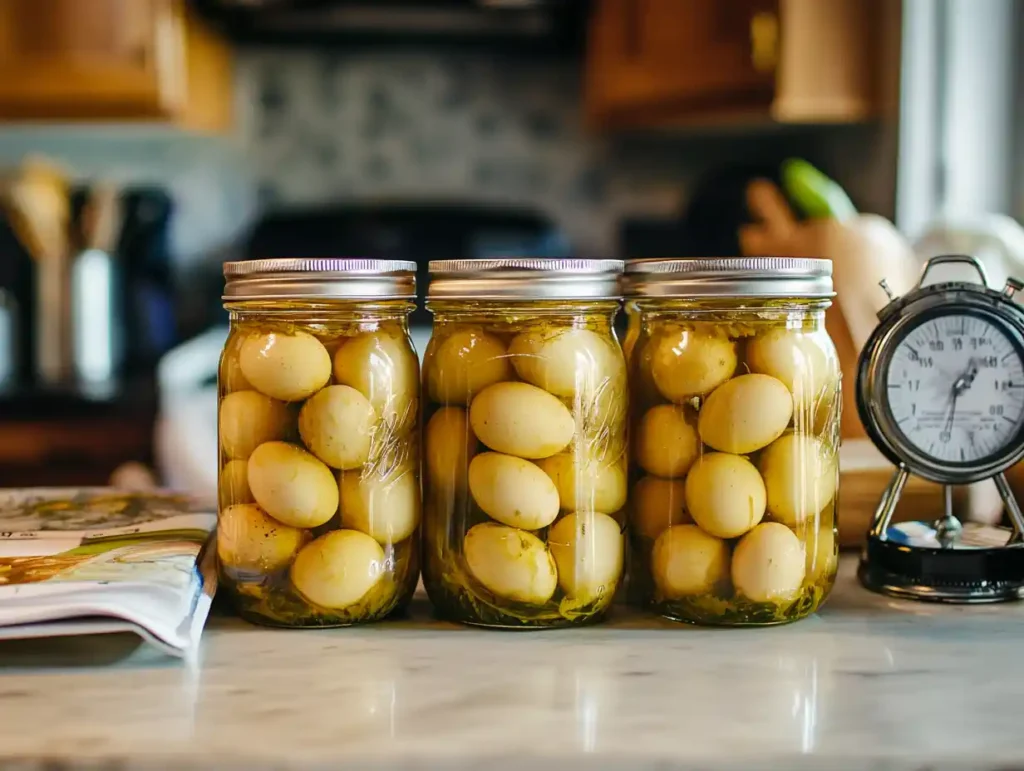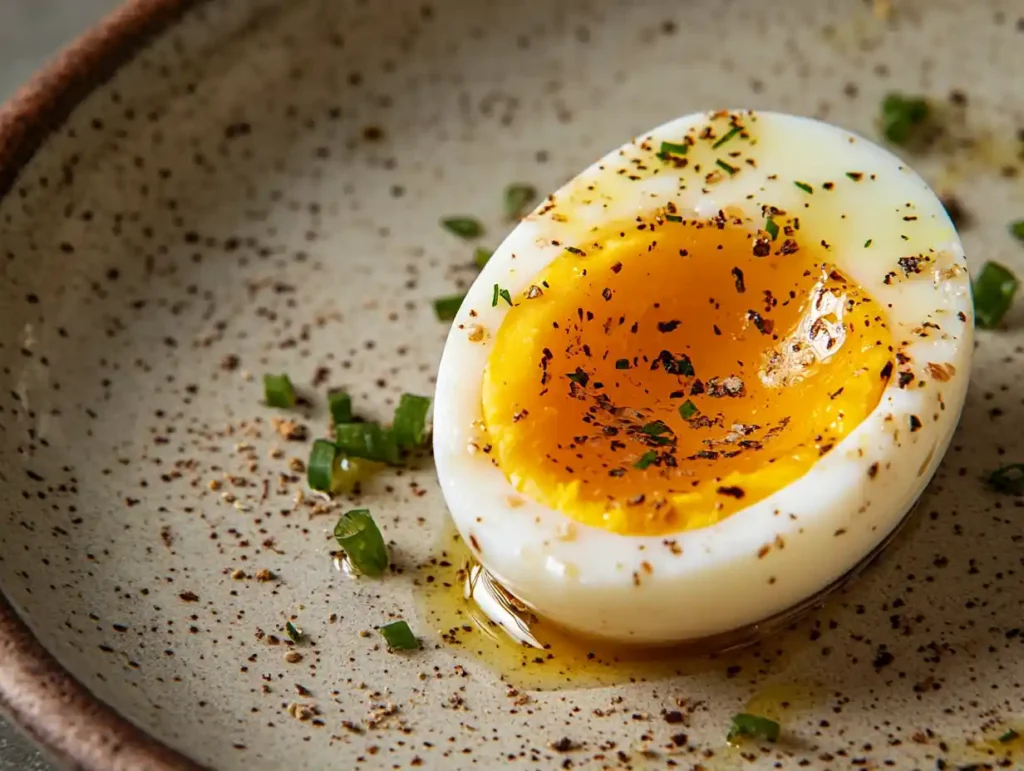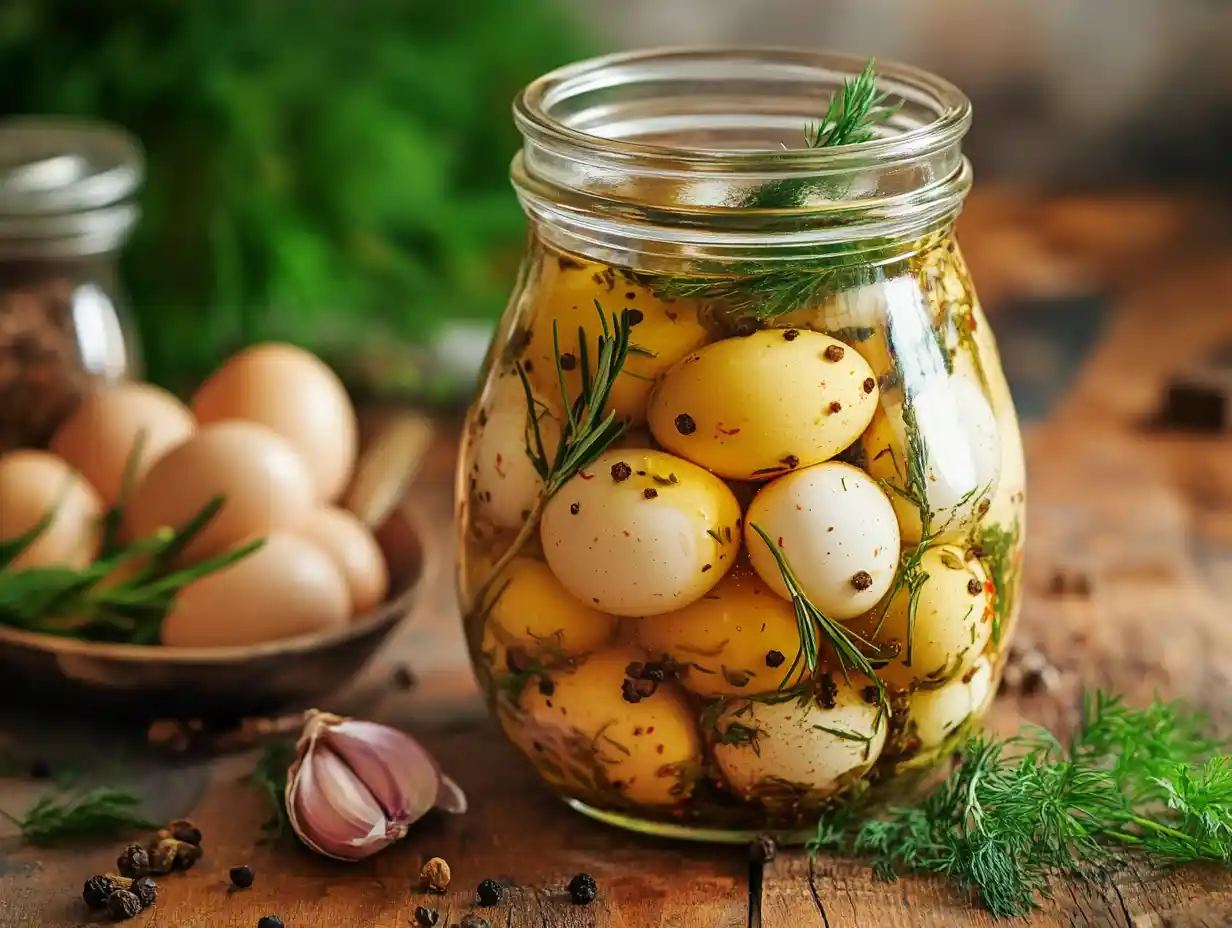Pickled eggs are a favorite snack in many parts of the world. They are enjoyed at pubs, as a quick protein boost, or as a tangy addition to meals. These preserved treats have stood the test of time. However, a common question arises: how long should eggs be pickled before eating?
The answer depends on several factors. These include the type of brine, egg size, and personal taste. It’s crucial to find the right balance. Eating eggs too soon might leave them under-pickled. Waiting too long can create an overpowering flavor or unwanted texture.
This guide explores the best pickling durations. We’ll also discuss factors that affect timing and tips to ensure perfect pickled eggs.
Why Timing Matters in Pickling Eggs
Timing is key to successful pickling. It affects flavor, texture, and safety. Eggs not pickled long enough may taste bland. Over-pickling can create rubbery eggs with a sharp, acidic flavor.
Getting the timing right ensures balanced tanginess and texture. Proper timing helps the brine penetrate to the yolk. This creates a cohesive and delicious flavor.
Table of Contents
The Basics of Pickling Eggs
Pickling has long been a cherished method for preserving food, offering both practicality and flavor enhancement. This simple yet transformative process uses vinegar or brine to turn plain boiled eggs into a tangy, delicious treat. Not only does it extend the shelf life of eggs, but it also adds a distinctive flavor that many people love.
What Does Pickling Involve?
To begin the pickling process, you must first boil and peel the eggs carefully to prevent cracks. Next, you soak them in a vinegar-based solution that usually contains spices, salt, and sometimes sugar. Over time, the eggs absorb the flavors of the brine, becoming more flavorful with each passing day. As a result, the acid in the vinegar not only preserves the eggs but also enhances their taste in a way that plain boiling never could.
A Brief History of Pickled Eggs
Historically, people turned to pickling as a practical solution for food preservation, especially before refrigeration was available. For centuries, this method helped households store surplus eggs, ensuring they stayed fresh for months. Eventually, pickled eggs became a common pub snack in Europe and America, where they were often paired with beer. Over time, this tradition spread, and today, different regions have adapted their recipes with unique spices and brine variations.
Why Pickle Eggs?
There are several reasons why pickling eggs remains so popular. Firstly, it significantly extends the eggs’ shelf life, making them an excellent option for long-term storage. Secondly, pickling transforms the flavor of eggs, turning them into a tangy delicacy that complements many dishes. Moreover, the process allows cooks to experiment with spices and herbs, creating customized flavors. In short, pickling offers both convenience and culinary creativity.
Common Uses for Pickled Eggs
Pickled eggs lend themselves to a variety of culinary uses. For example, pubs and diners often serve them as snacks alongside beer or cocktails, where their tangy flavor pairs perfectly with drinks. At home, many people enjoy them as a quick, protein-packed snack during busy days. Furthermore, sliced pickled eggs add a tangy twist to salads and sandwiches. For more adventurous cooks, they also serve as a flavorful ingredient in dishes like deviled eggs, which take on a whole new depth of taste.
Factors Affecting Pickling Time
The time it takes for pickled eggs to reach their peak flavor depends on several factors. While most recipes recommend a waiting period of at least 1 to 2 weeks, these variables can influence how quickly the brine penetrates the eggs and develops their taste. By understanding these factors, you can adjust your pickling process for the best results.
Egg Size and Type
The size of the eggs plays a significant role in how long they need to sit in the brine. Smaller eggs, such as quail eggs, absorb the brine more quickly and can be ready in as little as 5 to 7 days. On the other hand, larger eggs, like duck or jumbo chicken eggs, require more time—often up to 2 or 3 weeks—to fully develop their flavor. Additionally, eggs with thinner shells may allow the brine to penetrate faster compared to those with thicker shells.
Brine Composition
The type of brine you use greatly affects pickling time and flavor intensity. A stronger vinegar-based brine with higher acidity tends to pickle eggs more quickly than one with a milder concentration. Similarly, adding ingredients like salt, sugar, and spices can influence how long the eggs take to absorb the flavors. For example, a sweet and spicy brine may take slightly longer to achieve a balanced flavor compared to a simple, tangy vinegar brine.
Temperature and Storage Conditions
Temperature is another key factor in determining pickling time. When stored at cooler temperatures, such as in a refrigerator, the pickling process slows down. In contrast, eggs stored at room temperature in a sterilized environment may pickle faster, though this method is less common due to food safety concerns. For best results, most people pickle eggs in the refrigerator, allowing the brine to work steadily while maintaining safe storage conditions.
Desired Flavor Intensity
Your personal preference for flavor intensity will also impact how long you should wait before enjoying your pickled eggs. If you prefer a mild tang, you might taste them after 7 to 10 days. For a more robust and pronounced flavor, it’s better to wait at least 2 weeks or even longer. As a general rule, the longer you let the eggs sit in the brine, the stronger and more complex their flavor will become.
Brine-to-Egg Ratio
The ratio of brine to eggs is another factor that can influence the process. If the brine barely covers the eggs, the pickling may take longer because the solution isn’t evenly distributed. Conversely, ensuring that the eggs are fully submerged in the brine helps the pickling process proceed efficiently. Rotating the jar gently every few days can also promote even flavor absorption.
Freshness of the Eggs
Finally, the freshness of the eggs can make a difference. Fresher eggs have firmer whites, which might take slightly longer to absorb the brine. Meanwhile, slightly older eggs, which are easier to peel, often pickle faster due to their softer texture. Regardless of freshness, always ensure the eggs are boiled and peeled properly before pickling to achieve the best results.
Recommended Pickling Durations

Determining the ideal pickling duration is essential for achieving perfectly flavored eggs. While the exact time can vary depending on factors like egg size and brine composition, general guidelines provide a helpful starting point. Patience is crucial, as the pickling process requires time for the brine to penetrate the eggs fully and create a balanced flavor.
General Guidelines for Pickling Time
For standard chicken eggs, most recipes recommend waiting at least 7 to 14 days before consuming. This time frame allows the vinegar and spices in the brine to permeate the egg whites and begin flavoring the yolks. Smaller eggs, such as quail eggs, may be ready in as little as 5 to 7 days due to their size. Conversely, larger eggs or those with thicker shells often require up to 2 or 3 weeks to reach optimal flavor.
If you’re pickling for a special occasion, plan ahead to give your eggs ample time to develop their taste. Although they can be eaten sooner, allowing them to sit for the recommended duration will significantly enhance their flavor.
Quick Pickling for Mild Flavor
For those who prefer a milder flavor or are short on time, quick pickling is an option. In this method, you can consume the eggs after just 3 to 5 days. However, this approach works best for recipes with a highly acidic brine or when using smaller eggs. Keep in mind that quick-pickled eggs will have a less pronounced flavor compared to those left in the brine for a longer period.
Long-Term Pickling for Enhanced Flavor
For a more intense and robust taste, you can let the eggs pickle for 3 weeks or longer. Over time, the brine continues to infuse the eggs, resulting in a deeper flavor profile. This extended pickling period is ideal for recipes with complex spice blends or for those who enjoy a tangier, richer taste. Additionally, eggs pickled for a longer duration often develop a firmer texture, which many people find appealing.
Adjusting Timing Based on Egg Size
Egg size is a critical factor when deciding on the pickling duration. Smaller eggs, like quail eggs, absorb the brine faster due to their compact size. These eggs can be ready in just one week. Medium-sized chicken eggs typically need 1 to 2 weeks for full flavor absorption. Larger eggs, such as duck eggs, may require 2 to 3 weeks or more to achieve the desired taste.
Monitoring the Pickling Process
While following general guidelines is helpful, it’s also important to monitor your pickled eggs as they sit in the brine. You can check their readiness by slicing one open to see how far the brine has penetrated. If the yolk remains untouched by the brine, give the eggs a few more days to pickle. Regularly tasting a sample egg ensures you achieve your preferred flavor and texture.
Tips for Maximizing Flavor During Pickling
To ensure your eggs reach their full flavor potential, try shaking or rotating the jar gently every few days. This helps distribute the brine evenly, ensuring all eggs are submerged and absorbing the liquid uniformly. Using sterilized jars and airtight lids also prevents contamination, which could compromise the pickling process.
How to Tell if Pickled Eggs Are Ready

Knowing when your pickled eggs are ready to eat is crucial for enjoying the perfect balance of flavor and texture. While general timelines provide guidance, factors like personal taste preferences and brine ingredients mean that readiness can vary. Here’s how you can determine whether your eggs are ready for serving.
Visual Indicators of Readiness
One of the easiest ways to check if your pickled eggs are ready is to observe their appearance. As the eggs sit in the brine, the outer layer of the whites often takes on a slight color change, especially if the brine contains colorful ingredients like beet juice or turmeric. A uniform color on the surface suggests that the brine has begun penetrating evenly. However, if parts of the egg remain unchanged, they may need more time to soak.
Taste Testing
Taste testing is one of the most reliable methods for assessing pickling progress. After the recommended pickling period—usually one to two weeks—remove an egg and slice it open. Take a small bite to evaluate the flavor. If the tanginess is too subtle, the eggs may require additional time in the brine. Conversely, if the taste is too sharp, you might want to adjust future recipes to balance the vinegar concentration.
Texture Changes
Pickled eggs undergo noticeable texture changes as they absorb the brine. The egg whites tend to become firmer and slightly springy, while the yolk develops a creamier consistency. If the whites feel rubbery or overly tough, the eggs may have been over-pickled or left in an overly acidic brine for too long. On the other hand, under-pickled eggs may feel too soft, indicating that the brine hasn’t fully penetrated.
Brine Penetration to the Yolk
To determine if the brine has reached the yolk, slice one of the pickled eggs in half. Ideally, the yolk should show signs of flavor absorption, such as a slight color change or a tangy taste. If the yolk remains untouched by the brine, it indicates that the eggs need more time to pickle. Proper penetration to the yolk ensures a consistent flavor throughout the entire egg.
Signs of Over-Pickling
While rare, over-pickling can occur if eggs sit in the brine for an extended period. Over-pickled eggs may taste overwhelmingly acidic or develop an excessively firm texture. To avoid this, follow the recommended timelines and check your eggs regularly. If you prefer a milder flavor, remove the eggs from the brine once they reach your desired taste and store them separately.
The Role of Patience in Pickling
Patience is key to achieving the best pickled eggs. Although it might be tempting to sample them early, waiting the full recommended duration allows the flavors to develop fully. The pickling process is a gradual transformation that rewards you with eggs that are flavorful, tangy, and perfectly textured. To make the waiting period easier, try experimenting with different brines to keep the process exciting.
FAQs About Pickled Eggs
Pickled eggs often spark a variety of questions, especially for those trying the process for the first time. Below are some of the most frequently asked questions to help you perfect your pickling experience.
How long do pickled eggs last?
Pickled eggs, when stored properly in the refrigerator, can last for up to 3 to 4 months. The vinegar in the brine acts as a preservative, keeping the eggs fresh for an extended period. However, for the best flavor and texture, consume them within the first month. Always store the eggs in a sterilized jar with an airtight lid to prevent contamination.
Do pickled eggs need to be refrigerated?
Yes, pickled eggs must be refrigerated. Although the vinegar and brine slow bacterial growth, refrigeration ensures the eggs remain safe to eat. Store the jar in the coldest part of your fridge, and avoid leaving it at room temperature for long periods. Proper refrigeration is essential for both safety and flavor retention.
Can you reuse the brine?
Reusing brine is not recommended for safety reasons. Once the eggs have been pickled, the brine may contain residual proteins and bacteria from the eggs, which can lead to spoilage or contamination. Instead, prepare a fresh batch of brine for each pickling session. If you love the flavor of a particular recipe, you can recreate the brine using fresh ingredients.
What happens if the eggs aren’t fully submerged?
If the eggs are not completely covered by the brine, they may not pickle evenly. Exposed areas might spoil or develop an off taste. Always ensure the brine fully covers the eggs, and if needed, weigh them down with a sterilized object, such as a small lid or food-safe weight, to keep them submerged.
Can you pickle raw eggs?
No, you should not pickle raw eggs. The eggs must be hard-boiled and peeled before pickling. Raw eggs lack the firmness needed to absorb brine effectively and may pose a risk of contamination. Always boil your eggs thoroughly before starting the pickling process.
Why do pickled eggs sometimes taste too sour?
A sour taste often results from a brine that is too acidic or eggs left in the brine for too long. To reduce sourness, adjust the vinegar concentration in your brine recipe by adding a bit more water or sugar. If the eggs have already been pickled, pairing them with complementary foods like crackers or cheese can help balance the sharpness.
Conclusion
Pickling eggs is both a simple and rewarding culinary process. By understanding factors like pickling durations, brine composition, and storage practices, you can enjoy perfectly flavored pickled eggs every time. While the waiting period may require patience, the result is well worth it—a versatile, tangy treat that can elevate snacks, meals, and appetizers.
Whether you prefer quick-pickled eggs or those with a deep, robust flavor, the key is to experiment and find what works best for your taste. Follow the tips in this guide, and you’ll soon master the art of pickling eggs. Enjoy the process, and don’t forget to share your creations with friends and family!
For more ideas on how to enjoy pickled eggs, check out this Spicy Pickled Eggs Recipe. Curious about storage? Learn How Long Pickled Eggs Last in Vinegar. And if you’re a fan of classic pickle flavors, don’t miss this Claussen-Style Dill Pickle Recipe!

